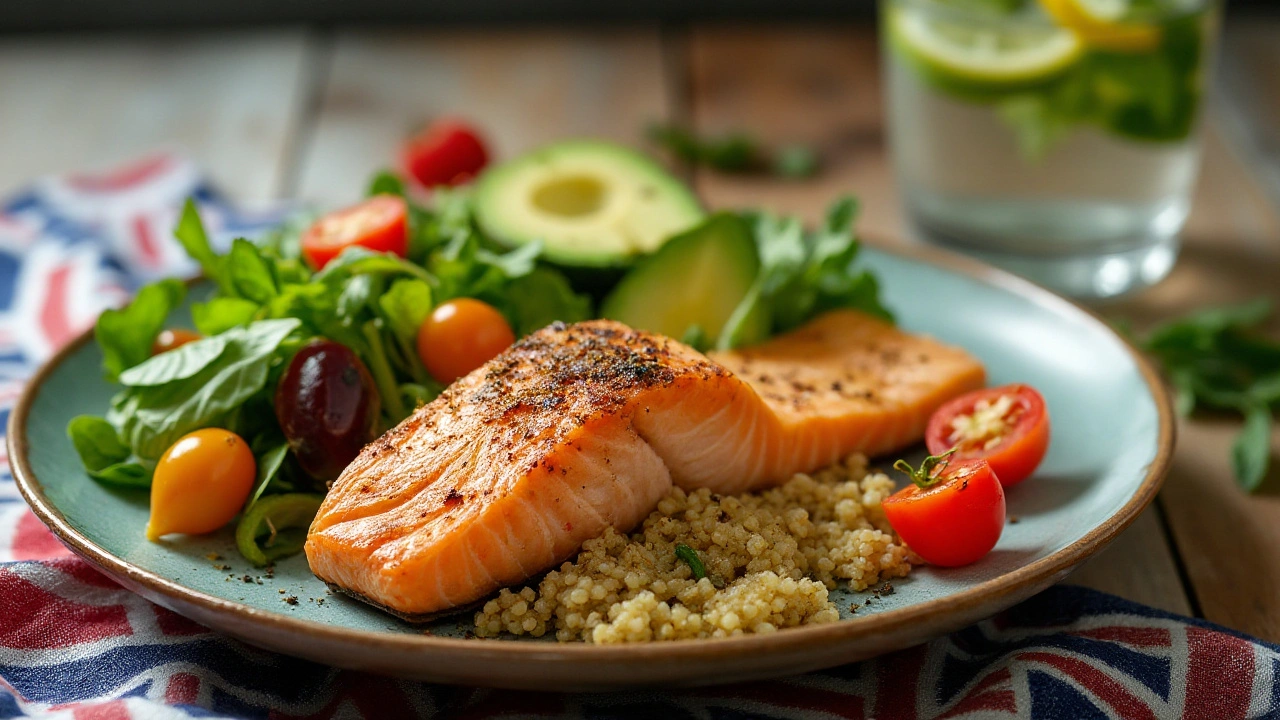
Eating healthy is about more than just losing weight; it's about feeling your best and optimizing your health. Whether you're aiming to boost your energy levels, improve your mood, or manage a health condition, understanding what goes into a nutritious diet is key.
With so much information out there, it can be hard to know where to start. This guide will break it down for you, from the importance of balanced meals to the benefits of whole foods. Get ready to make informed choices that will revitalize your eating habits.
- Understanding Nutrition Basics
- Importance of a Balanced Diet
- Choosing Nutrient-Dense Foods
- Healthy Meal Planning
- Tips to Stay Consistent
Understanding Nutrition Basics
Eating healthily starts with grasping the basics of nutrition. Our bodies are complex systems that require a mix of nutrients to function at their best. Proteins, carbohydrates, fats, vitamins, and minerals each play unique roles. For starters, proteins are the building blocks for tissues and muscles. They’re essential for repairing and maintaining our bodies. Sources of protein include meat, dairy, and legumes. Each of these foods supplies the body with amino acids, which are vital for various bodily functions.
Carbohydrates often get a bad rap, but they are the body's primary energy source. There are simple carbs like sugars and complex carbs found in whole grains and veggies. Choosing the right carbs can have a big impact on your energy levels and overall health. Opt for complex carbohydrates, as they release energy slowly, keeping you full longer. Brown rice, quinoa, and whole wheat bread are some healthy choices.
Fats are another critical component of a healthy diet. But not all fats are created equal. You want to avoid trans fats, which are prevalent in processed foods, and focus on healthy fats. These can be found in avocados, nuts, and olive oil. Healthy fats support cell growth and help absorb some nutrients. Omega-3 fatty acids, in particular, are excellent for heart health. They can be found in fish like salmon and flaxseeds.
Vitamins and minerals are like the unsung heroes of nutrition. They support a myriad of functions, from bone health to immune support. For instance, vitamin C is crucial for healing wounds and maintaining healthy skin. It's abundant in citrus fruits and bell peppers. Calcium is another essential nutrient, important for strong bones and teeth. Dairy products, leafy greens, and fortified foods are good sources.
Water, though sometimes overlooked, is an essential part of our diet. It keeps us hydrated, supports digestion, and helps regulate body temperature. Adults should aim to drink about eight 8-ounce glasses of water a day. Of course, your needs might vary based on activity level, climate, and overall health.
One interesting fact to note is that the quality of your food can affect how well your body absorbs nutrients. Eating nutrient-dense foods ensures you get the most out of what you eat. Overprocessed foods, on the other hand, often lack essential nutrients and can lead to deficits over time. Dr. Michael Greger, a well-known nutrition expert, once said,
"Eat foods with an ingredient list of one, and avoid those with ingredient lists that are longer than your grocery receipt."
Importance of a Balanced Diet
A balanced diet is not just a modern-day fad; it’s a fundamental aspect of overall health and well-being. When we refer to a balanced diet, we're talking about integrating different essential nutrients — proteins, fats, carbohydrates, vitamins, and minerals — into our daily food intake. This balance ensures our bodies function optimally and reduces the risk of chronic diseases.
One of the benefits of a balanced diet is that it helps maintain a healthy weight. Consuming the right portions of nutrient-rich foods keeps your metabolism in check and prevents overeating. This isn't just about cutting calories but making sure every calorie counts by filling your plate with high-quality foods.
Balanced diets are also crucial for heart health. Foods rich in omega-3 fatty acids, such as fish and nuts, support heart function. Meanwhile, fiber from fruits, vegetables, and whole grains helps reduce cholesterol levels. According to the American Heart Association, an appropriate diet can lower the risk of heart disease by up to 31%.
“A balanced diet is crucial for our optimal health and wellbeing,” says Dr. Caroline Jones, a renowned nutrition expert. “It provides the necessary macro and micronutrients our bodies need to function effectively.”
Incorporating a variety of nutrient-dense foods is essential for the immune system too. Vitamins like C and E, and minerals such as zinc and iron, found in leafy greens and seeds, boost immune responses, making your body more resilient to infections. Regular consumption of these can keep common illnesses at bay.
While many focus on the physical benefits of a balanced diet, the mental health aspect should not be overlooked. Foods rich in antioxidants, vitamins, and minerals can reduce oxidative stress, which is linked to depression. Serotonin, a key hormone that stabilizes mood, relies on the amino acid tryptophan found in foods like turkey, eggs, and cheese.
Additionally, following a balanced diet is advantageous for digestive health. Probiotic foods, such as yogurt, and fiber-rich foods facilitate a healthy gut flora and regular bowel movements. A healthy digestive system can prevent conditions like bloating, constipation, and even more severe gastrointestinal disorders.
To make a balanced diet part of your lifestyle, it’s practical to consider meal planning. Preparing meals in advance can help you ensure that each meal is nutritionally complete, reducing the chances of resorting to unhealthy snacks or fast food. An example of a balanced meal can include grilled salmon, quinoa, spinach salad, and a piece of fruit. This plate provides a mix of macronutrients and essential vitamins.
The benefits don’t stop at physical health; balanced eating habits can boost focus and productivity. Foods that stabilize blood sugar levels like whole grains and proteins help maintain steady energy levels throughout the day. This can prevent the afternoon slump and keep your brain sharp during important tasks.
Achieving a balanced diet doesn’t mean eliminating treats entirely but rather moderating them. Enjoying your favorite dessert once in a while is perfectly fine, as long as it's part of a broader, balanced dietary plan. This balance ensures you stay motivated and satisfied over the long term.

Choosing Nutrient-Dense Foods
When it comes to adopting a healthy diet, one crucial factor is choosing nutrient-dense foods. These are foods rich in vitamins, minerals, and other essential nutrients relative to their calorie content. This approach ensures each bite you take packs a nutritional punch, helping you get the most out of your meals while maintaining a balanced caloric intake.
One of the best ways to start is by incorporating a variety of fruits and vegetables into your daily regimen. These colorful choices not only brighten up your plate but also provide a wide range of vitamins and fiber. For example, leafy greens like spinach and kale are excellent sources of Vitamin K and folate, while berries such as blueberries and strawberries are packed with antioxidants that combat free radicals in the body.
As nutrition expert Dr. Jane Smith notes, "Eating a variety of colorful fruits and vegetables every day can significantly boost your nutrient intake and improve overall health."
Whole grains are another vital component. Unlike refined grains, which have been stripped of valuable nutrients during processing, whole grains keep the bran, germ, and endosperm intact, offering more fiber, B vitamins, and essential minerals. Include foods like quinoa, brown rice, and oatmeal to optimize your diet.
Incorporating Lean Proteins
Proteins are the building blocks of our bodies, playing an essential role in muscle repair, immune function, and hormone production. Choosing lean proteins like chicken, fish, tofu, and legumes can aid in maintaining muscle mass without the added saturated fats. Fish, particularly fatty fish like salmon and mackerel, are also excellent sources of omega-3 fatty acids, which help reduce inflammation and support heart health.
| Food | Key Nutrients |
|---|---|
| Quinoa | Protein, Fiber, Magnesium |
| Blueberries | Vitamin C, Antioxidants |
| Salmon | Omega-3 fatty acids, Protein |
Nuts and seeds are tiny powerhouses of nutrition. Almonds, chia seeds, and flaxseeds, for instance, offer healthy fats, protein, and fiber. They can be easily added to salads, yogurt, or smoothies, providing a satisfying crunch and extra nutrients.
Dairy or fortified plant-based alternatives also play a role in a nutrient-dense diet. These foods are often rich in calcium, Vitamin D, and other essential nutrients. If you're lactose intolerant or vegan, make sure you're choosing fortified options to meet your dietary needs.
Healthy eating isn't about deprivation; it's about making informed choices that nourish your body. By focusing on nutrient-dense foods, you can enjoy delicious meals that support your health and well-being. Remember, it's not about perfection but progress, one meal at a time.
Healthy Meal Planning
Planning healthy meals doesn't have to be a time-consuming task, but it does require a bit of organization and knowledge. The first step in achieving a balanced diet is to create a meal plan that incorporates a variety of nutrient-dense foods. This ensures you get the right balance of carbs, proteins, and fats, as well as essential vitamins and minerals.
Begin with a weekly planner and outline your meals for each day. This might sound tedious at first, but it can save you time and stress during the week. Having a plan helps you avoid the impulse to grab unhealthy options when you're in a rush. Make sure to include a mix of whole grains, lean proteins, healthy fats, and plenty of fruits and vegetables.
To make your meal plan manageable, start by choosing a few simple recipes that follow the principles of a balanced diet. Look for dishes that can be made in large quantities and stored for quick meals throughout the week. Batch cooking is your friend; preparing larger portions that you can keep in the fridge or freezer can make a huge difference on busy days. For example, cooking a big pot of quinoa or brown rice can provide a base for several meals.
According to the Harvard School of Public Health, 'A healthy eating routine involves all the food groups and provides the nutrition that your body needs to stay healthy, feel good, and have energy.'
Another key element of meal planning is variety. Eating the same foods day after day can lead to nutritional deficiencies and boredom. Try to mix things up by incorporating different proteins (like fish, chicken, beans, and tofu) and varying your vegetables to cover a broad spectrum of nutrients.
Don't forget snack planning. Healthy snacks can help keep your energy levels stable throughout the day and prevent overeating at meals. Think about including options like nuts, yogurt, fresh fruit, and veggies with hummus. Keeping these snacks ready and available can help you avoid reaching for less nutritious options when hunger strikes.
Shopping smart is crucial for effective meal planning. Make a list of the ingredients you'll need for the week and stick to it when you shop. This not only helps in sticking to your healthy diet but also saves money and reduces food waste. Aim to shop the perimeter of the store where whole foods are usually located, rather than the processed food aisles.
Finally, stay flexible. Sometimes life gets in the way of the best-laid plans, and that's okay. If you miss a planned meal or make a less-than-ideal choice, don't stress. Just get back on track as soon as you can. The goal is consistency over time, not perfection.

Tips to Stay Consistent
Sticking to a healthy diet can feel daunting, especially with life's daily demands. But staying on track doesn't have to be a struggle. These practical tips can help you maintain consistency without sacrificing the joy of eating.
Firstly, set realistic and achievable goals. Big changes can be overwhelming, so break them down into smaller, manageable steps. For instance, start by including one extra serving of vegetables into your meals each day. Gradual progress is more sustainable and doesn't feel like a burden.
Another key to maintaining consistency is meal prep. Preparing meals ahead of time can save you from making unhealthy choices when you're hungry and in a rush. Spend some time on weekends prepping ingredients or even entire meals. Store these in the fridge or freezer so you can always have balanced meals ready to go.
“Eating nutritious food consistently is more about forming habits than constantly making decisions,” says Dr. Michael Greger, a physician and nutrition expert. “Once healthy eating becomes a routine, it becomes easier to sustain.”
Keep your pantry stocked with healthy staples. Nuts, whole grains, canned beans, and frozen vegetables are all excellent options that have a long shelf life. This way, you can always whip up something nutritious without needing a last-minute grocery run.
Plan for indulgences too. No one is perfect, and it's okay to enjoy your favorite treats. The key is moderation. Allow yourself an occasional treat to avoid feelings of deprivation which can lead to binge eating.
Support is vital. Surround yourself with people who respect your goal of healthier eating. Whether it's family, friends, or an online community, having a support network can provide encouragement and accountability. Share recipes, celebrate small victories, and lean on each other during tough times.
Mistakes will happen, and that's okay. If you slip up, don't be too hard on yourself. Use it as a learning experience and get back on track with your next meal. Consistency is about the long-term journey, not perfection.
Tracking your progress can be motivating. Whether it's through a food diary, an app, or photos, seeing your improvements can boost your morale and keep you focused. It’s also an excellent way to identify any patterns or triggers that may lead to unhealthy choices.
Lastly, keep educating yourself. The more you know about nutrition and the benefits of a healthy diet, the more likely you are to stay committed. Read books, listen to podcasts, or follow reputable nutrition blogs. Knowledge equips you to make better decisions and stay inspired on your health journey.





